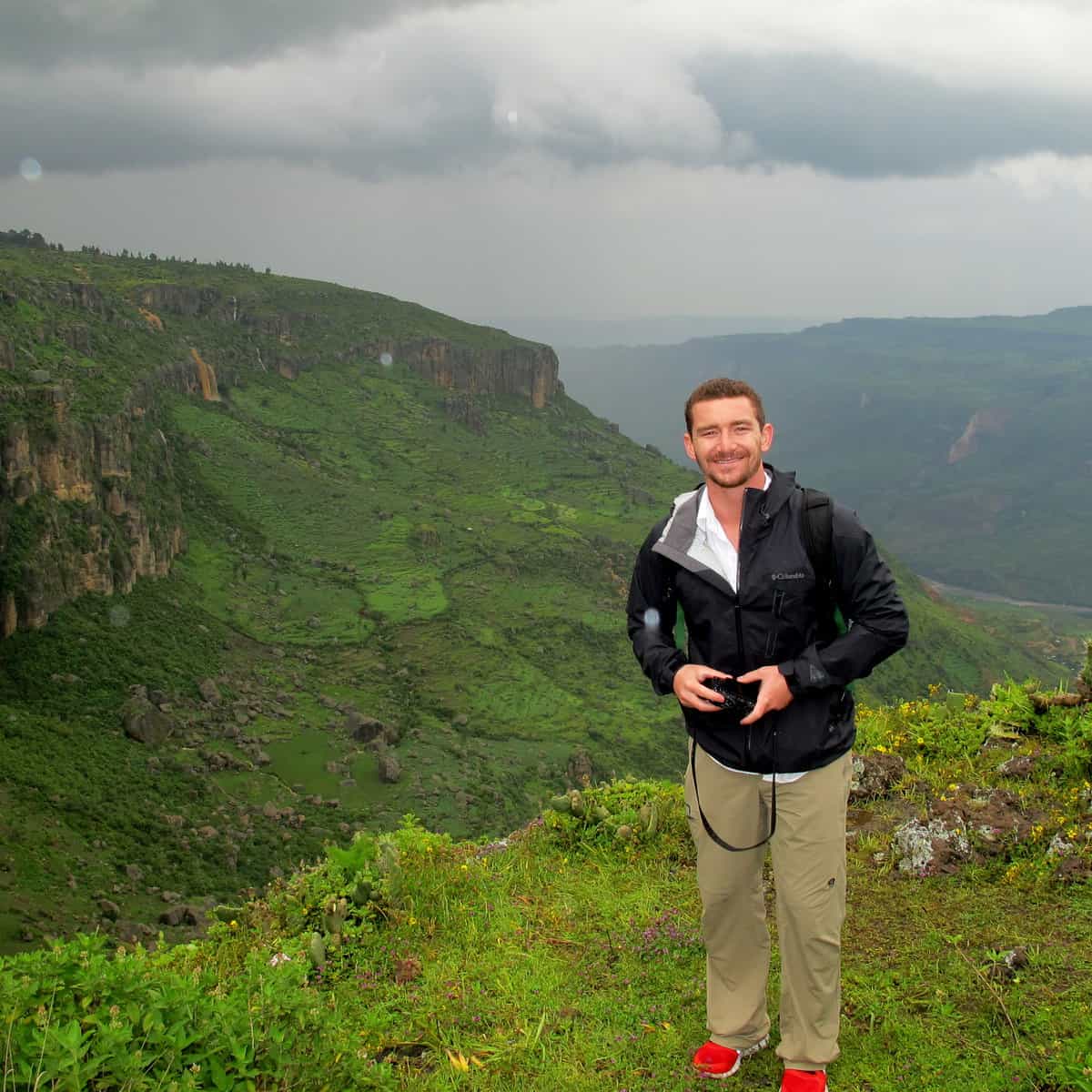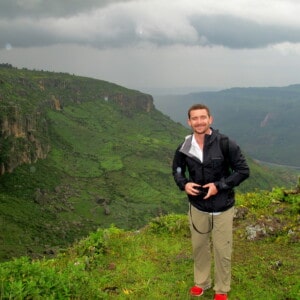Reaching Max Sandler for a chat can be tough these days. Telephone service and Internet reception are unreliable near Gondar, Ethiopia where the Norfolk Academy and College of Charleston graduate is currently living and working. For that matter, so are other things many in Tidewater would consider necessities, such as running water and electricity.
Sandler, though, is reveling in the experiences that are so vastly different than the privileged lifestyle in which he grew up in Virginia Beach, and the adult life the 26-year-old has been making for himself in Northern Virginia.
For the next year, Sandler will live and work in Ethiopia as a Jewish Service Corps fellow. The Jewish Service Corps is an initiative of the American Jewish Joint Distribution Committee’s (JDC) Entwine network, which features education and awareness programs for young professionals.
Sandler and his family are quite familiar with JDC. His mother, Annie, is a JDC board member, and in 2008, Sandler went on a JDC board of director’s mission to both Ethiopia and Rwanda. He became involved in Entwine when he moved to Northern Virginia in 2009, throughout his internship with Republican Whip Eric Cantor and his subsequent work in the consumer finance industry for Mariner Finance.
In Gondar, as well as working in a JDC-supported school teaching English and leading programs, Sandler will work on JDC projects connected to providing access to education, water and public health initiatives.
After several attempts at talking over the phone, failed, Jewish News and Sandler were finally able to chat last month—via email:
JN: Where are you living? What are your living accommodations like?
MS: I live in a two-story house. We have views of the village and the surrounding mountains. The house itself is three bedrooms, three bathrooms, a living room and kitchen. It is very comfortable.
How do you get around? (Mode of transportation?)
One thing that I love about Gondar is that the entire city is walkable. That being said, we also use Bajajs (also called a tuk tuk, it’s a small three wheeled vehicle with a canopy), taxis and minibuses. The minibuses are the cheapest and stop at all of the main areas (GTZ, College, Hospital and Piazza). Our most frequent mode of transportation is our car, which is supplied by JDC.
You’ve been in Ethiopia for, what, a month? What’s the most interesting thing you’ve seen and done since you’ve been there?
This Monday will make it a month. The most interesting thing I have seen is the slaughtering of a sheep on New Years Day in Addis Ababa. A lot of Ethiopians celebrate their New Year with a feast. Lamb is a huge part of the diet here. Every part of the animal was used and I mean every part. It was something that I probably won’t watch again but it was great to see once.
What’s the saddest thing…?
The saddest thing for me is the poverty. Most Ethiopians live on less then a dollar a day. Really think about that. A dollar a day. It doesn’t get any easier to see. Naturally you want to help everyone. Luckily there are a variety of ways to do that and it doesn’t just have to be monetary.
What’s the most joyful thing…?
The most joyful thing I’ve experienced was attending Rosh Hashanah services in Gondar. I felt completely at home. Naturally everyone wants to know who you are and what you are doing here because we’re different. But no one treats you like an outlier.
What kinds of food are you eating?
I absolutely LOVE Ethiopian food and I eat it almost every meal. Some favorites are tibs (which is a like a meat stir fry with onions and green peppers), red lentils and shiro tegabino (chick peas with onions and green peppers). This being said you can find a variety of food in Gondar. Many restaurants serve pasta, rice, pizza and hamburgers. We had yogurt this morning, which is very rare. In addition, the produce here is wonderful. We enjoy going to the Merkato (local market) and buying fresh fruit and bread to keep at home.
What do you miss the most about life in America?
The thing that I miss most about America is the connectivity. You always have cell phone service and Internet. I was always connected to family and friends and you get all of your information instantaneously. Here it’s slower. Having Internet isn’t a given even in some of the hotels. We don’t always have power. Running water is touch and go. The beauty of the experience is that we adapt. We take everything as it comes and we still have most of the comforts of home. If we don’t have power we use candles. If the water isn’t running we fill up buckets. We have everything that we could possibly need.
You blog about showering in the rain and having no running water (or being able to count on it, OR communication service). That’s quite a difference from how you were raised, “the lifestyle to which you’d become accustomed.” Is your life in Ethiopia something you ever imagined would be part of your story?
I visited Ethiopia in 2008 with JDC. When I stepped foot on the plane to come home I knew I would be back, the only thing I didn’t know was in what capacity. I could not be happier with where I am.
The answer to this question would depend on when you asked me. Five years ago I would not have thought I’d be living in Gondar, Ethiopia some time in the future. Two years ago I started strongly considering living and working abroad and here I am. I worked hard to get this opportunity and I couldn’t be more proud to be doing what I am doing.
I believe the best way to learn about a culture is full immersion. We don’t have a choice whether to learn the language here or not. We’re learning to communicate. Nothing is too difficult to get accustomed to. We have things in common with the people around us; friends, family, etc. There are plenty of things to talk about. Everyone here is crazy about soccer just like I am. It’s been a huge help.
Did you celebrate Rosh Hashanah? What was that experience like?
We did celebrate Rosh Hashanah. We went to services at the Jewish Community Center in Gondar. It was a great experience. I sat in the back by myself. Men and women sit separately so Elizabeth—another JDC Entwine Global Jewish Service Corps fellow—and I sat separately but I didn’t feel alone. As I mentioned earlier people want to know who you are and what you’re doing in Gondar. Everyone is incredibly friendly. For me, services were different from home. The prayers sounded different although I recognized many of them. I felt a connection with the people there. Dirt floor, rusty benches, it was beautiful. The synagogue was full. It was an experience I will remember for the rest of my life.
Your career was on an upward path—not that it isn’t still, but this is vastly different than what you were doing before. What influenced your decision to become a JSC Fellow for a year?
This is a great question. I could write a few pages but I’ll try to keep it short. I was doing very well at my job. I had recently been promoted and was heading for another promotion. This being said I wasn’t fulfilled. For the last few years I’ve strongly considered moving abroad and having a different type of experience. When someone first mentioned the JDC Entwine Global Jewish Service Corps to me I was intrigued. I looked into it a little more and then I applied. When I first submitted my application I didn’t know if this was right for me. Some people said to go travel. Others thought that it was just some sort of bug.
I have always believed in tzedakah, something my parents instilled in all of their kids. I also believe in tikkun olam—repairing the world. We may not be able to change the world, but it’s absolutely our duty to try. The JDC Entwine Global Jewish Service Corps offered all of these things. An experience, an opportunity to grow personally and a way to do a small part in making the world a better place. This is truly a wonderful program and one that I am happy to be a part of. Do I believe this will help me professionally? Absolutely. This program will teach me life skills that I may never learn otherwise. I was elated when I was accepted and even more so when I found out my placement was in Gondar.
Why did you want to go to Ethiopia?
The thing that really drew me to Ethiopia was the need. I have been here before and seen the different ways that JDC helps people here. It is inspiring. On my first trip I was lucky enough to be present when a school building was dedicated. As soon as my family returned home we donated money to build one as well—the Chilo Primary School. Yesterday I got to see Chilo for the first time. It is beautiful. Things like a three room school building, which a lot of students take for granted in the US, aren’t always common here. You can literally change lives by raising money, donating money, or coming here and volunteering your time to help.
How does your personal interpretation of Jewish values fit in with the work you are/will be doing?
When describing my motivations for this program I use terms associated with Judaism, mainly tzedakah and tikkun olam. These are values taught to me by my parents and reinforced throughout my Jewish upbringing. They are a strong part of who I am. It is our duty not only as Jews but as human beings to help each other. I don’t think these values are specific to Jews but it does help make us who we are.
Is there anything you would like to share with the community about the work the JSC and JDC do in Ethiopia?
There is so much to be done here. And you have no idea how thankful people are until you hear it for yourself. JDC is doing amazing things in Ethiopia. I’m sure you’ve heard about their work in Addis and their medical director Dr. Rick Hodes. If not, please look into him. Dr. Hodes is an inspiration.
Money goes a long way here. JDC is devoted to helping this community. They are currently constructing a Science Center in Gondar that is very modern and will be one in a network of Science Centers in neighboring countries. JDC operates a clinic here that helps a lot of people receive needed medical attention that they wouldn’t get otherwise. JDC sponsors nursing students and supports their four years of undergraduate education at the Gondar University Hospital. They support people like Elizabeth and me to get on the ground here and lend a hand in any way possible. JDC’s work here improves and saves lives. When you say you’re here with “The Joint” everyone knows whom you are talking about. JDC’s reputation precedes it and this is simply due to their track record of successful initiatives here.
Max Sandler is documenting his life in Ethiopia on his blog: www.tibsfordinner.blogspot.com.
Through generous gifts, the United Jewish Federation of Tidewater supports the American Jewish Joint Distribution Committee and its initiatives—such as Entwine—as well as many other local, national, global and Israeli Jewish organizations. To find out more or to make a gift, visit www.jewishva.org.
by Laine Mednick Rutherford


